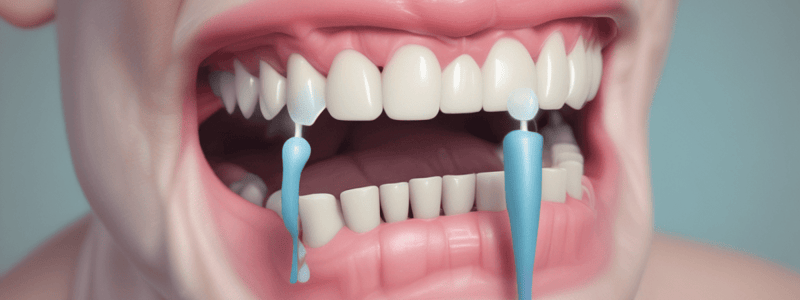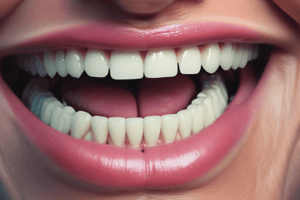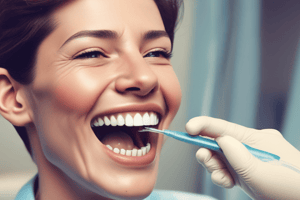Podcast
Questions and Answers
Prednisolone is a type of antibiotic used to treat dentin hypersensitivity.
Prednisolone is a type of antibiotic used to treat dentin hypersensitivity.
False (B)
Fluoride iontophoresis drives calcium ions into the dentinal tubules.
Fluoride iontophoresis drives calcium ions into the dentinal tubules.
False (B)
Arginine-based products, such as ProArgin, use bicarbonate as a pH buffer.
Arginine-based products, such as ProArgin, use bicarbonate as a pH buffer.
True (A)
Laser therapy is a painful treatment for dentin hypersensitivity.
Laser therapy is a painful treatment for dentin hypersensitivity.
Oxalates are typically used in dentin bonding agents to treat dentin hypersensitivity.
Oxalates are typically used in dentin bonding agents to treat dentin hypersensitivity.
Fluoride plays a role in increasing dentinal permeability.
Fluoride plays a role in increasing dentinal permeability.
Dentifrices containing 10% strontium chloride are effective in treating dentin hypersensitivity.
Dentifrices containing 10% strontium chloride are effective in treating dentin hypersensitivity.
Potassium nitrate reduces dentin hypersensitivity by covering open tubules with a thin film.
Potassium nitrate reduces dentin hypersensitivity by covering open tubules with a thin film.
Fluoride decreases dentinal permeability by precipitating calcium fluoride crystals in the tubules.
Fluoride decreases dentinal permeability by precipitating calcium fluoride crystals in the tubules.
Oxalates dissolve open dentinal tubules to reduce hypersensitivity.
Oxalates dissolve open dentinal tubules to reduce hypersensitivity.
Dentin bonding agents can be applied to seal the dentinal tubules and reduce hypersensitivity.
Dentin bonding agents can be applied to seal the dentinal tubules and reduce hypersensitivity.
Gingival grafts are always necessary to treat dentin hypersensitivity.
Gingival grafts are always necessary to treat dentin hypersensitivity.
GaAlAs laser deposition is used to alter nerve transmission in dentin hypersensitivity treatment.
GaAlAs laser deposition is used to alter nerve transmission in dentin hypersensitivity treatment.
Bioglass contains silica as a main component which acts as a nucleation site for precipitation of calcium and phosphate.
Bioglass contains silica as a main component which acts as a nucleation site for precipitation of calcium and phosphate.
Nanohydroxy apatite paste technology is used to treat carious lesions but not dentin hypersensitivity.
Nanohydroxy apatite paste technology is used to treat carious lesions but not dentin hypersensitivity.
Er:YAG laser is used to coagulate proteins within the dentinal tubules and block fluid movement.
Er:YAG laser is used to coagulate proteins within the dentinal tubules and block fluid movement.
Nanodentistry deals with materials with component sizes greater than 100 nm in dimension.
Nanodentistry deals with materials with component sizes greater than 100 nm in dimension.
Adhesion to dental hard tissues after Er:YAG laser etching is superior to that obtained after conventional acid etching.
Adhesion to dental hard tissues after Er:YAG laser etching is superior to that obtained after conventional acid etching.
The argon laser produces high intensity visible red light (488nm) which is able to initiate photopolymerization of light-cured dental restorative materials.
The argon laser produces high intensity visible red light (488nm) which is able to initiate photopolymerization of light-cured dental restorative materials.
Laser radiation is not able to alter the surface chemistry of both enamel and root surface dentine.
Laser radiation is not able to alter the surface chemistry of both enamel and root surface dentine.
The temperature increase at the level of the dental pulp is higher with argon laser curing than when conventional quartz tungsten halogen lamp units are used.
The temperature increase at the level of the dental pulp is higher with argon laser curing than when conventional quartz tungsten halogen lamp units are used.
Microirregularities on the enamel surface do not offer a mechanism of adhesion without acid-etching.
Microirregularities on the enamel surface do not offer a mechanism of adhesion without acid-etching.
The use of argon laser curing results in a longer curing time and a decreased depth of cure.
The use of argon laser curing results in a longer curing time and a decreased depth of cure.
The word 'laser' is an acronym for Light Amplification by Stimulated Emission of Radiation.
The word 'laser' is an acronym for Light Amplification by Stimulated Emission of Radiation.
Dental lasers are named based on the active medium that is not stimulated.
Dental lasers are named based on the active medium that is not stimulated.
Laser light is unique in that it is polychromatic (light at multiple specific wavelengths).
Laser light is unique in that it is polychromatic (light at multiple specific wavelengths).
The active medium in a laser can be a solid state crystal rod.
The active medium in a laser can be a solid state crystal rod.
The wavelength of a laser's light does not affect its interactions, indications, and specificity for use in treatment procedures.
The wavelength of a laser's light does not affect its interactions, indications, and specificity for use in treatment procedures.
Laser light is directional due to its high divergence.
Laser light is directional due to its high divergence.
Lasers can be used to modify the calcium to phosphate ratio in dental hard tissues, making them more resistant to acid attack.
Lasers can be used to modify the calcium to phosphate ratio in dental hard tissues, making them more resistant to acid attack.
The Er: YAG laser is not effective in desensitizing hypersensitive dentine.
The Er: YAG laser is not effective in desensitizing hypersensitive dentine.
Laser irradiation of enamel surfaces makes them more susceptible to acid attack.
Laser irradiation of enamel surfaces makes them more susceptible to acid attack.
Laser bleaching aims to achieve a slower power bleaching process using a less efficient energy source.
Laser bleaching aims to achieve a slower power bleaching process using a less efficient energy source.
Laser therapy is a painless treatment for dentin hypersensitivity.
Laser therapy is a painless treatment for dentin hypersensitivity.
Laser is used to prevent caries by modifying the dental hard tissues.
Laser is used to prevent caries by modifying the dental hard tissues.
Contamination of an exposure of the pulp by microorganisms is a rare cause of pulp irritation.
Contamination of an exposure of the pulp by microorganisms is a rare cause of pulp irritation.
Streptococci, lactobacilli, and actinomyces are types of microorganisms that can cause irritation of dental pulp and periradicular tissues.
Streptococci, lactobacilli, and actinomyces are types of microorganisms that can cause irritation of dental pulp and periradicular tissues.
The response of pulp to bacteria is dependent on the speed of bacterial ingress and the speed of progress of caries.
The response of pulp to bacteria is dependent on the speed of bacterial ingress and the speed of progress of caries.
Systemic diseases such as tuberculosis, leprosy, and actinomycosis are common causes of pulp irritation.
Systemic diseases such as tuberculosis, leprosy, and actinomycosis are common causes of pulp irritation.
The population of microorganisms in dental caries decreases significantly in the deepest layers of carious dentin.
The population of microorganisms in dental caries decreases significantly in the deepest layers of carious dentin.
Microbial irritants can cause immediate necrosis of the pulp.
Microbial irritants can cause immediate necrosis of the pulp.
Industrial acids can cause demineralization of the labial surface of anterior teeth.
Industrial acids can cause demineralization of the labial surface of anterior teeth.
Frequent ingestion of low pH cola drinks can cause erosion of tooth structure.
Frequent ingestion of low pH cola drinks can cause erosion of tooth structure.
Silicate filling material is compatible with pulp tissue.
Silicate filling material is compatible with pulp tissue.
Chronic vomiting can cause erosion on the palatal surface of the upper teeth.
Chronic vomiting can cause erosion on the palatal surface of the upper teeth.
Taking concentrated hydrochloric acid through a straw or glass tube can cause erosion on the lingual surface of the upper teeth.
Taking concentrated hydrochloric acid through a straw or glass tube can cause erosion on the lingual surface of the upper teeth.
Fruits juices are not acidic enough to cause erosion of tooth structure.
Fruits juices are not acidic enough to cause erosion of tooth structure.
The healthy pulp responds by depositing a layer of reparative dentine over its pulp surface.
The healthy pulp responds by depositing a layer of reparative dentine over its pulp surface.
Pulp inflammation is always significant when the caries reaches within 1 mm of the pulp.
Pulp inflammation is always significant when the caries reaches within 1 mm of the pulp.
The amount of circulation affects the pulp tissue's response to inflammation.
The amount of circulation affects the pulp tissue's response to inflammation.
Tooth preparation can cause pulp trauma due to the extensive removal of dentin.
Tooth preparation can cause pulp trauma due to the extensive removal of dentin.
The width of the cavity has no effect on the pulp.
The width of the cavity has no effect on the pulp.
Bacteria can persist at the site of necrosis after pulp exposure.
Bacteria can persist at the site of necrosis after pulp exposure.
The removal of the coronal portion of a vital pulp is known as pulpotomy.
The removal of the coronal portion of a vital pulp is known as pulpotomy.
Pulpotomy is generally recommended for permanent teeth rather than deciduous teeth.
Pulpotomy is generally recommended for permanent teeth rather than deciduous teeth.
Glass-ionomer liner or base can be used as a restorative material in teeth with conventional direct pulp caps.
Glass-ionomer liner or base can be used as a restorative material in teeth with conventional direct pulp caps.
Rinsing with sterile saline can facilitate hemostasis.
Rinsing with sterile saline can facilitate hemostasis.
Mixing and applying a thin layer of pure calcium hydroxide can cause tissue necrosis.
Mixing and applying a thin layer of pure calcium hydroxide can cause tissue necrosis.
A hard-setting calcium hydroxide liner can cause tissue necrosis in the same manner as pure calcium hydroxide.
A hard-setting calcium hydroxide liner can cause tissue necrosis in the same manner as pure calcium hydroxide.
Direct pulp capping is indicated for pulp exposures resulting from caries removal, tooth preparation, or trauma.
Direct pulp capping is indicated for pulp exposures resulting from caries removal, tooth preparation, or trauma.
Pulp tissue jeopardized by acute inflammation is always a suitable candidate for direct pulp capping.
Pulp tissue jeopardized by acute inflammation is always a suitable candidate for direct pulp capping.
A hard-setting calcium hydroxide liner is applied directly to the exposure site in direct pulp capping.
A hard-setting calcium hydroxide liner is applied directly to the exposure site in direct pulp capping.
Glass ionomer base/liner material is not used to protect the calcium hydroxide dressing in direct pulp capping.
Glass ionomer base/liner material is not used to protect the calcium hydroxide dressing in direct pulp capping.
Dentin/enamel bonding system is not used to seal the cavity preparation and restore the tooth in direct pulp capping.
Dentin/enamel bonding system is not used to seal the cavity preparation and restore the tooth in direct pulp capping.
Chlorhexidine solution is not used to aid in hemostasis during direct pulp capping.
Chlorhexidine solution is not used to aid in hemostasis during direct pulp capping.
The entire mass of coronal pulp tissue is removed in a partial pulpotomy.
The entire mass of coronal pulp tissue is removed in a partial pulpotomy.
MTA is a material used for vital pulp therapy.
MTA is a material used for vital pulp therapy.
Calcium hydroxide is used to cap the pulp tissue in a partial pulpotomy.
Calcium hydroxide is used to cap the pulp tissue in a partial pulpotomy.
The inflammatory response of pulp tissue is dependent on the speed of bacterial ingress and the speed of progress of caries.
The inflammatory response of pulp tissue is dependent on the speed of bacterial ingress and the speed of progress of caries.
Resin-modified glass ionomers are used as dentin adhesives.
Resin-modified glass ionomers are used as dentin adhesives.
The repair of affected pulpal tissue is only possible through the use of antibiotics and growth factors.
The repair of affected pulpal tissue is only possible through the use of antibiotics and growth factors.
Flashcards are hidden until you start studying




